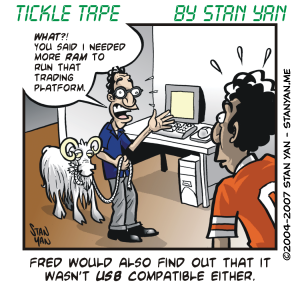Do you ever feel the pressure to perform? If you are making a short-term trade during a hectic trading day, you may have trouble controlling your emotions. You may have a trading plan clearly spelt out, but when it comes to executing it during a rough trading day, you may abandon it. Here’s how Bo, a seasoned trader, described his early trading experiences to our Innerworth staff. “When I first started to trade, I almost had a few panic attacks. My pulse quickened. My hands sweat and I could not breathe.
This mental state clouds your judgment and you tend to make a lot of wrong decisions, like getting out at the very, very bottom after a stock has fallen. You’ve sort of denied reality that it’s falling and when you finally hit that level of pain, you get out and the stock then bounces. I was definitely in a negative emotional state and I had to break the emotional cycle and get back into reality and objectivity.”
When your emotions take over, it can be hard to think calmly and rationally. Your mind can be thrown completely off track. Bo described what happened when he lost control. “I’d come into a trade with a very clear, objective stop-loss strategy for exiting if things went wrong. But once I entered a trade, I started to second-guess myself. I would get a little bit of profit showing and want to take the sure bet right away, rather than letting profits run.”
It’s essential to remember that your mind and body are closely related. When you are trading under stress, your body reacts physically with agitation. Your thoughts start racing and you cannot easily slow them down. You either must get up and leave the trading arena, or calm down before making a trading error. The best way to calm down is to use a form of meditation.
A simple form of meditation is to close your eyes, concentrate on your breathing, and repeat a favourite phrase that will calm you down, such as “Everything will be all right.” The main idea is to get your mind to slow down and allow your thoughts to move away from the market action that is shaking your focus. Once you regain your composure and can concentrate fully, you can return to monitoring your trade.
Bo had a novel way of getting his mind to move into a meditative state. “I play the drums. When you’re playing the drums, you have all four appendages going at once and usually independently. You’ll have both hands doing a different pattern on a cymbal and a snare drum and your feet are both going in different rhythms as well. Something about that touches something deep inside me and takes me to a meditative place where I feel a sense of flow.” Bo discovered he could quickly bring forth this meditative state during the trading day.
“One day, I started juggling and it brought me into that same state I felt like a drummer. So I started to use that as a tool to break away from the almost hysterical emotional response I felt while trading, and returned to a place of more objective, dispassionate observation.” So how does juggling work? “It requires so much focus. If you’re going to throw those balls around and not drop them, you have to take your mind away from the stock and your fears, and focus on that moment, namely, where the balls are going and where your hands need to be. It’s almost a meditative state when you get that flow going and are in the zone.”
Trading requires an optimal mental state, but many times the markets just don’t cooperate. The stress wears down your ability to maintain self-control. When that happens, it’s vital to calm down and return to a focused, meditative state.


